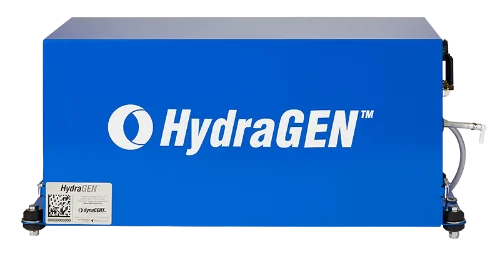
FAQ
“What is HydraGEN™ and what does it do?”
HydraGEN™ is a carbon emissions reduction device for all types and sizes of diesel engines. It produces pure hydrogen and oxygen from distilled water. Hydrogen gas introduced into the air mixture creates a faster combustion of the diesel to burn more efficiently and completely.
“Does the HydraGEN™ system alter or modify the engine’s computer or control system?”
No, HydraGEN™ Technology does not change, alter or modify the engine’s control system or computer.
“What applications is the HydraGEN™ Technology compatible with?”
The HydraGEN™ Technology was created for use with all sizes of diesel engines. Depending on the engine size, different models of HydraGEN™ technology should be used.
“Will use of this system void any manufacturer warranties?”
dynaCERT has letters from most OEMs stating that warranties are not voided through the proper installation and use of the HydraGEN™ Technology, unless proven that the technology was at fault. For circumstances where warranty coverage does not apply, dynaCERT has a secondary liability coverage should HydraGEN™ Technology be at fault up to CAD$5,000,000.
"Are engine modifications required when installing the HydraGEN™?"
There are no engine modifications required when installing a HydraGEN™ unit.
"Will the HydraGEN™ improve fuel economy and by how much?"
The HydraGEN™ will improve a vehicle’s fuel economy. Results will vary but generally the fuel savings will be between 6 and 20%.
“How many miles must be driven to recover the cost of the unit?”
Accumulated fuel savings, DPF regen and DEF savings equate to a ROI of about 8-12 months, or roughly 200,000-250,000 miles, at 6% fuel savings.
“How can you see how much fuel savings you are actually getting?”
dynaCERT’s HydraLytica analytics system is currently under development, to help create a baseline fuel consumption and track fuel consumption post installation. Clients are getting real life applications of 5-20% savings. Results will vary depending on a number of variables including driver, trailer load, driving terrain, vehicle and environmental conditions.
"Will the HydraGEN™ help reduce emissions?”
Independent 3rd part tests have shown reductions up to 88% NOx, 47% CO, 19% CO2, 57% THC and 55% Particulate matter
"Will HydraGEN™ help reduce the "Green House Effect"?”
Installation of a HydraGEN™ unit will ensure your THC, CO, CO2 and NOx will be considerably reduced as a result of the more complete combustion in the engine.
“Does the fuel improvement of mpg vary by speed?”
It varies by speed, load factor and application of the engine. Engines used in applications requiring high idle times will generally have a higher fuel consumption than those that are run at a steady and lower rpm.
“How often is service/maintenance required?”
Regular maintenance includes refilling the unit with distilled water approximately every 50 hours of operation.
“Does the longevity of the units allow for removal from one engine and placement into another when a tired fleet is upgraded to newer model vehicles?”
Yes. A HydraGEN™ unit has a designed life of 10 years. All installations and unit removal should only be preformed by a certified HydraGEN™ technician.
“Can these units be rebuilt or refurbished, or do they need to be replaced?”
Should a problem occur with the HydraGEN™ unit, a certified HydraGEN™ technician will determine if the system can be fixed on site or if the unit must be replaced. Unit refurbishing should only be done by dynaCERT.
“How long do the anode/cathode last?”
The HydraGEN™’s anode/cathode are manufactured from 316L stainless steel and should never need replacement.
The HydraGEN™’s anode/cathode are manufactured from 316L stainless steel and should never need replacement.
HydraGEN™ Technology has been engineered to operate at temperatures as low as -60 degrees Celsius. Should the system freeze, built in heaters will turn on automatically, bringing the unit to operating temperatures in about 3 hours. During this time, the engine will continue to operate normally.
“What happens in the event of a product failure?”
In the event of a failure of a HydraGEN™ unit, the system will stop producing gas and will shut off. Contact your local HydraGEN™ dealer to schedule a service call. Continue to operate your engine as required.
"Will the HydraGEN™ function on other fossil fuel (e.g. gasoline) internal combustion engines?"
Current HydraGEN™ Technology has been designed specifically for internal combustion engines using diesel fuel. Future models are planned for other Fossil Fuels.
"How much electrical energy does the HydraGEN™ consume?"
The maximum consumption of electrical power is approximately 15-25 Amps in winter conditions. This is about the same amount of energy consumed by the vehicle’s headlights.
“Since the HydraGEN™ uses the truck’s battery, does it make the truck less efficient?”
The alternator of an engine is designed to continually recharge the batteries of the engine when the engine is running. While the engine is running, the alternator normally produces enough power for the vehicle as well as extra power which is unused. Adding a HydraGENTM unit uses this excess power that would normally go to waste.
"Can anyone install the HydraGEN™ unit?"
Only a certified HydraGEN technician can install or service a HydraGEN™ unit. Contact your local HydraGEN™ dealership for installations.
"Will the HydraGEN™ repair an old and neglected engine?"
HydraGEN™ technology will not repair an engine. HydraGEN™ technology does not interact with the engine. While it will enhance the combustion of the fuel in the engine, it does not affect engine activity in any other manner.
"How is this possible for the engine to become cleaner (over time) and increase engine oil life?"
The improved engine combustion results in less carbon build up inside the engine. The outcome of this is a cleaner running engine with cleaner oil, longer engine life and lower overall engine maintenance, resulting in lower overall costs.
"Is hydrogen safe to use?"
Hydrogen gas is safe in low concentrations and when not stored. HydraGEN™ technology produces small quantities, and does not store any, hydrogen gas. Acting as a hydrogen-on-demand system, no hydrogen gas is produced in excess of what is consumed, allowing the HydraGEN™ system to remain unpressurized.
"Certain companies are utilizing hydrogen today in their fuel cell. Is the HydraGEN™ technology similar?"
Hydrogen fuel cells are being researched and designed to utilize hydrogen as an alternative main fuel. Fuel cells use hydrogen gas to create electricity, which is then used to power electrical motors. HydraGEN™ technology uses electricity created by the running of the engine to break water molecules apart into hydrogen and oxygen.
“Which brands of engines are there currently HydraGEN™ installations on?”
Currently, there are installations on Cummins, Volvo, Detroit Diesel, John Deere, Komatsu, Mack, Navistar, Caterpillar, EMD, MAN and Mercedes Benz engines.
“How is the water turned into hydrogen and oxygen?”
The process of converting water into hydrogen and oxygen gasses is called electrolysis. Electrolysis requires an electrolyte solution which allows an electrical current to travel through water. The electricity is used to break up water molecules into their individual elements. These elements then bond to other like molecules to create pure gasses.
“How are the H2 and O2 gases delivered to the engine?”
A high temperature gas line is used to connect the gas output to the air intake of the engine. This gas line is connected after the air filter and before the turbo of the engine.
“How does it integrate with original equipment manufacturer fuel systems?”
HydraGEN™ does listen to the engine controller but does not alter or change the engine technology or affect warranty statements.
“Does HydraGEN™ technology make the engine ignition combust at a hotter temperature? Will this cause the engine to overheat?”
The introduction of hydrogen gas to the air mixture creates a higher peak temperature and faster combustion of the diesel. As a result, the overall temperature of the engine decreases.
“Does HydraGEN™ increase engine stress levels or engine pressure?”
No, HydraGEN™ technology does not.
“Is there any injection of water into the engine?”
No, HydraGEN™ Technology only delivers dry H2 and O2 gases to the engine air intake. No water is injected.
“Isn’t Potassium hydroxide corrosive?”
The KOH electrolyte used in HydraGEN™ technology is in a closed reactor and is not introduced to the engine or air stream.
“Is HydraGEN™ technology market ready?”
Yes, it is currently available now for use on Class 6 to 8 diesel trucks, refrigeration units, power generators, construction equipment, mining and forestry equipment and rail locomotives. dynaCERT is currently undergoing testing to get accreditation for use in marine applications.
“What ́s the expected lifetime of a HydraGEN™ unit?”
The expected lifetime is approximately 10 years.
"How can I Contact a dynaCERT Dealer in the Asia Pacific?
Simply click to send us an email or go to our About Us page.

